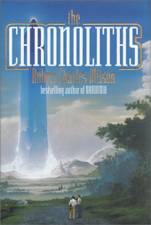

| Click on a book's image or title to order from Amazon.com |

The Chronoliths
Tor, HC, © 2001, 256 pp, ISBN #0-312-87384-0Reviewed January 2002
The Chronoliths has a central idea so tasty that you figure even if the story turns out to be not quite what it appears, it will still have been an enjoyable read. Here's how it goes:
Scott Warden is a software jock living in Thailand in 2021 with his wife and daughter, even though work opportunities have dried up due to the Asian recession. While there, two important things happen: His daughter, Kait, develops a serious infection rendering her deaf in one ear and nearly deaf in the other, and Scott isn't there to help his wife cope with the issue because a large, blue monolith has appeared out of nowhere several miles away bearing an inscription that a warlord named Kuin will conquer Thailand in 2041 - 20 years later.
After returning to America and being divorced from his wife, Scott follows the progression of further Chronoliths which appear across Asia, some of them decimating major cities since they produce a shockwave and lower the nearby temperature considerably when they arrive. Eventually Scott is roped into a government program, run by his college mentor Sue Chandra, to research the nature of the Chronoliths and maybe find a way to destroy one of the indestructible monuments, or better yet, prevent one from appearing.
Over the next 15 years, the global economy decays and the political situation gets ever hotter as Kuin preemptively "conquers" most of Asia, and governments try to find out who he is and what he wants. Large cults devoted to Kuin or devoted to a coming revolution in his name emerge, driving the world further to the brink, as Chronoliths continue to appear and America worries that it might be the next target.
Wilson writes The Chronoliths from Scott's point of view, when he's writing his memoirs years later, so the appearance of the monuments is seen often from a distance (and occasionally from unusually close by), and large chunks of the story are given to Scott's relationship to Kait, her involvement with the Kuinists, and Scott's own coping with the changes the world goes through. One of the problems with this approach is that Scott's life doesn't seem particularly remarkable - and therefore not particularly interesting, either - by the light of the genre. It feels like a fairly standard not-quite-post-apocalyptic-but-getting-there story, and Scott's emotional connection to his daughter often feels a bit distant to us, the readers. The Kuinists seem a bit too generic and Scott's family similarly so to really engage us.
And this is doubly disappointing since what I think most readers come to this book hoping for is a rollicking good adventure involving the Chronoliths, their reason for existence, and their background.
The nature of the Chronoliths is where the novel shines the brightest. Its most compelling central notion is the "feedback loop" which Kuin's actions are creating, not only by using the Chronoliths (presumably) to strengthen his hold on the future world, but by causing the future to in a sense become the past. Wilson pulls off this trick by refusing to give in to the "alternate futures" notion of time travel: The past can't be changed, so elements in the future which must have occurred due to the Chronolith's presence must therefore occur. Moreover, certain people are destined (in a sense) to become involved since only they can provide the necessary knowledge or drive to cause what's known about the future to come to pass. It's cleverly handled, and provides a novel sense of motivation to Scott and Sue.
Where the story ultimately doesn't work, though, is in the answers to the central questions, "Who is Kuin?", "Why is he conquering the world?", and "Why is he creating the Chronoliths". Wilson is, ultimately, writing a novel about his small cast of characters, how they affect the world (and their own lives), and additionally making a comment on how large groups of people will behave given circumstances such as those in the novel. Given this, Kuin is really just the cause of the story, permeating the book from its edges, but never really coming out of the shadows to really satisfy our questions.
Ultimately, you have to be satisfied with Scott's characterization of the years leading up to Kuin, and his implications about what happened later, and why it happened. And, frankly, I was disappointed. While I can respect Wilson's writing a novel about individuals and that he wants to focus on Scott and his circle, it's tough to have a high-concept set-up like this and not deliver the high-concept payoff.
The Chronoliths does deliver an engaging narrative and some good ideas to chew on, and perhaps it's my hopes that need adjusting more than the story. Still it seems there could have been more oomph here.
hits since 27 January 2002.